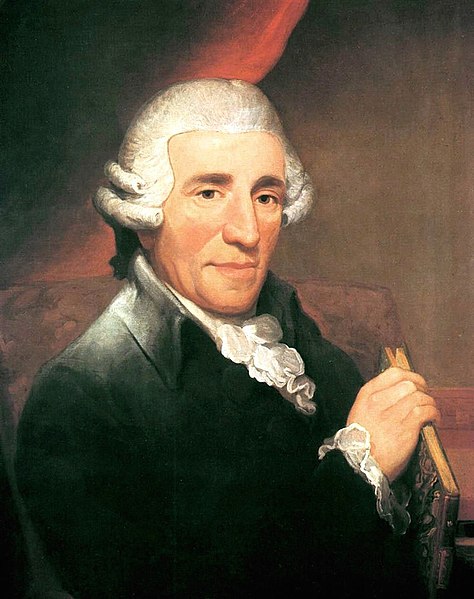“Loving a child doesn't mean giving in to all his whims; to love him is to bring out the best in him,
to teach him to love what is difficult.”
AUTHOR: Nadia Boulanger
MEANING OF THE QUOTE:
“The greatest gift of love you can give a child is to teach him/her how to love the
challenge of achieving personal goals.”
SURPRISE
Surprise Symphony No.94 in G
Movement 1
Movement 1
Surprise Symphony No.94 in G
Movement 2
Movement 2
Surprise Symphony No.94 in G
Movement 3
Movement 3
Surprise Symphony No.94 in G
Movement 4
Movement 4
Haydn No. 94: Still Surprising After Hundreds of Years
Joseph Haydn's No. 94 Surprise Symphony
by
by
Joshua Taylor, Yahoo! Contributor Network
Joseph Haydn composed Symphony no. 94 for the first of his two visits to London. The symphony in G major was first performed on March 23, 1792 and has gained the nickname of being called The Surprise symphony. This nickname is appropriately given because of the double-forte outburst followed by a loud hit of the drum that appears in the second and fourth movements. Starting the movement with strings relaxing the audience for the opening four measures, the "burst" occurs at the beginning of the fifth measure.
It is rumored that Hayden wrote this part in order to wake the ladies and gentlemen of the crowd who may have fallen asleep during the first movement, but other scholars simply say that it was to be competitive with his former pupil Ignaz Pleyel who was writing such clever devices into his own works. Whatever the case, Symphony no. 94 is widely popular because of the "Surprise" heard in the second movement. The form of this movement is homophonic with an orchestra of oboes, flutes, horns, trumpets, bassoons, with timpani and strings.
For the Andante, Haydn wanted to write variations on a universally well known tune. Written in 2/4 time, "Twinkle, Twinkle, Little Star" is the tune that is very noticeable throughout the piece in its many different contours. The movement opens with two eight-bar sections of this tune that are repeated. Violins and bass play the beginning section, preceding the surprise heard at the end of the repeat section. The opening features pianissimo plucking of the violin strings in major key. The theme is then presented in four different variations. First it enters as a shortened theme softly followed by a variation in minor key.
This variation is played by trumpets and timpani leading the way for solos from the first oboe and flute. The middle section finishes with a forte repeat of the theme, with the coda section repeating and re-harmonizing the opening notes once more. It is in this last section where the first violin plays the elaborate theme while the rest of the orchestra plays the melody or the accompanying motive. There are many abrupt transitions between the loud and soft parts of the andante, as well as a development of the theme moving through various keys and evolutions starting around two minutes into the piece.
This build up of the principle melody provides a transitional section amongst the many different theme variations. As part of Haydn's London success, Symphony no. 94 is marvelous to listen to. Widely known and named for its famous second movement, the andante is clever and interesting as well as being a bit frightful to the unexpected listener. Keeping his music new and cunning, Haydn wrote a piece of music that is still enjoyable over two hundred years later.
LINKS
http://96.32.105.119/membership/component/k2/item/54-symphony-no-94-%E2%80%93-surprise-mvt-2-haydn
http://boomwhacker.biz/assets/pdf%20docs/TuTi3%2027%20Surprise%20Sym%20SA.pdf
http://www.classicsforkids.com/teachers/lessonplans/pdfs/haydn/haydn3-5.pdf
http://boomwhacker.biz/assets/pdf%20docs/TuTi3%2027%20Surprise%20Sym%20SA.pdf
http://www.classicsforkids.com/teachers/lessonplans/pdfs/haydn/haydn3-5.pdf
http://www.kennedy-center.org/calendar/?fuseaction=composition&composition_id=2843
http://en.wikipedia.org/wiki/Symphony_No._94_(Haydn)
http://andrewfilmer.wordpress.com/publications-and-recordings/wake-up-and-listen-a-little-history-of-musical-surprise/
http://en.wikipedia.org/wiki/Symphony_No._94_(Haydn)
http://andrewfilmer.wordpress.com/publications-and-recordings/wake-up-and-listen-a-little-history-of-musical-surprise/
http://voices.yahoo.com/haydn-no-94-still-surprising-after-hundreds-years-31293.html
GENERAL MUSIC
01. KEYBOARD THEORY WORKSHEET WITH SHARPS and FLATS
........a. WORKED ON WORKSHEET #2 IN CLASS TOGETHER FINDING WHITE and BLACK KEY NAMES
........b. TURNED IN WORKSHEET #1 FOR GRADING
02. KEYBOARD ASSIGNMENTS
........a. PLAYING THE "B A G" RECORDER SONGS ON THE KEYBOARD
.............1) READING MUSIC NOTATION WE PREPARED LAST WEEK STUDENTS PLAY THE SAME SONGS WE
PLAYED ON THE RECORDER ON THE KEYBOARD
........b. PENTATONIC (BLACK KEY) NOTE SONGS BY EAR ON THE KEYBOARD
........c. SONGS IN PINK BOOK ("YANKEE DOODLE")
(Teacher observance and help given as needed)
ADV. STRINGS
01. VOLVER, VOLVER
02. SABOR A MI
03. STAIRWAY TO HEAVEN
04. MY HEART WILL GO ON
BEG. STRINGS
02. SABOR A MI
03. STAIRWAY TO HEAVEN
04. MY HEART WILL GO ON
BEG. STRINGS
01. CABALITO
02. SABOR A MI
03. YOU'VE GOT A FRIEND IN ME
02. SABOR A MI
03. YOU'VE GOT A FRIEND IN ME


